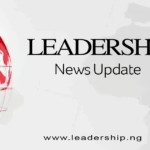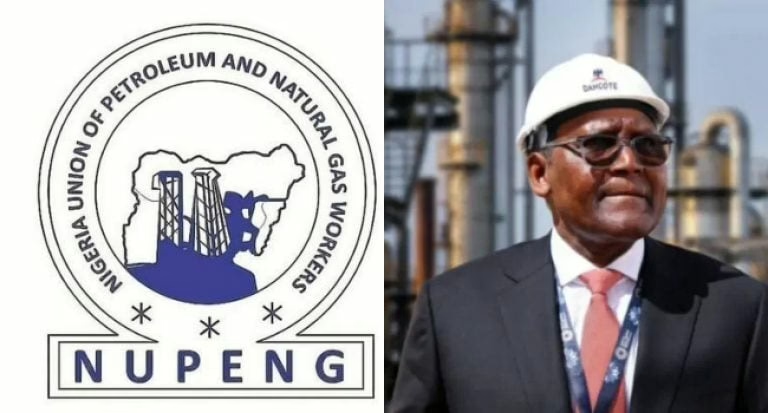Aliko Dangote, Africa’s wealthiest individual, currently finds himself embroiled in significant challenges that have disrupted his usual composure. Over the past year, Dangote has engaged with the media far more frequently than in the previous five years combined, signaling the gravity of the issues he faces.
Last year’s well-publicized conflict with the Nigerian National Petroleum Corporation (NNPC) was just the beginning. Presently, Dangote is confronting a fresh dispute involving labor unions threatening to halt operations at his $20 billion refinery unless workers are permitted to join their unions.
The tension between the Nigeria Union of Petroleum and Natural Gas Workers (NUPENG) and Dangote Refinery has escalated, with the Petroleum and Natural Gas Senior Staff Association of Nigeria (PENGASSAN) expressing full support for NUPENG and threatening to participate in a shutdown of refinery activities.
From my perspective, this situation appears to be a form of orchestrated coercion masquerading as advocacy for workers’ rights.
One must question the rationale behind compulsory union membership. Reports have emerged of union members obstructing Dangote’s trucks, an act that could be classified as deliberate sabotage.
When did unions gain the authority to mandate membership and hold businesses hostage?
While these unions claim to champion workers’ interests, their actions suggest an attempt to leverage Dangote’s success for financial gain, regardless of whether the employees desire such representation.
Fortunately, the National Industrial Court in Abuja has issued an interim injunction preventing NUPENG and the Direct Trucking Company Drivers Association from initiating industrial action or coercing truck drivers into union membership. Justice E.D. Subilim also barred the unions from blocking roads or disrupting operations at Dangote Refinery and other enterprises.
This ruling is a positive step. No union should wield the power to enforce membership or cripple vital national infrastructure over unmet demands. Such tactics transcend collective bargaining and verge on economic sabotage.
However, Dangote’s challenges extend beyond labor disputes. He has publicly accused influential ‘oil cartels’ within Nigeria’s petroleum sector of actively undermining his refinery, drawing parallels to the forces that devastated the country’s textile industry decades ago.
During the refinery’s first anniversary celebration of petrol production, Dangote highlighted how international traders and local marketers are attempting to flood the Nigerian market with cheap, subsidized fuel to weaken domestic production-a strategy that previously led to the collapse of textile and refinery industries in other African nations.
“The same tactics that destroyed other sectors are now being used against us,” he cautioned. This serious allegation warrants thorough investigation.
What Dangote describes is a form of economic warfare-deliberate attempts to dismantle local industries through unfair competition and product dumping. This pattern has been witnessed before in sectors like textiles and pharmaceuticals.
Foreign competitors often saturate markets with low-cost, subsidized goods to eliminate local producers, only to hike prices once competition is removed.
Despite these obstacles, Dangote’s accomplishments remain impressive. Between June and September 2025, the refinery exported over 1.6 billion liters of petrol, demonstrating its capacity to meet Nigeria’s needs while generating foreign exchange. The refinery has effectively ended Nigeria’s chronic fuel shortages and reduced petrol prices from nearly ₦1,100 per liter to approximately ₦841 in some regions.
“We have struggled with fuel shortages for half a century. Eradicating them is a milestone worth celebrating,” Dangote remarked, a sentiment that resonates deeply.
Yet, instead of applauding this progress, some parties seem intent on undermining it. The union threats are particularly alarming given the refinery’s ongoing battle against market manipulation by international actors.
To clarify, Dangote has invested $20 billion of personal funds to establish infrastructure that benefits all Nigerians by creating employment, earning foreign currency, and ending decades of fuel scarcity. Instead of receiving support, he faces coordinated opposition from various fronts.
While unions assert they defend workers’ rights, compulsory membership equates to coercion, not freedom. Workers should have the autonomy to decide whether to join unions. Mandating membership is as oppressive as barring union participation.
Moreover, what tangible benefits do these unions offer that justify forced enrollment? If their services were genuinely valuable, workers would join voluntarily. The reliance on threats and coercion suggests otherwise.
The timing of these union demands is suspicious. The refinery operates smoothly, employees are compensated, and no significant labor unrest is evident. This sudden push for unionization appears opportunistic rather than rooted in genuine worker welfare.
This scenario exemplifies a broader issue in Nigeria: instead of nurturing and safeguarding successful enterprises, there is a tendency to exploit them. Many seek to claim a share of success without contributing to its creation.
The government must adopt a firm stance. Nigeria cannot afford to lose this refinery to union intimidation or market manipulation. The stakes include energy security, foreign exchange earnings, job creation, and industrial growth.
While the court’s injunction is a commendable initial measure, further action is necessary. Authorities should investigate claims of market manipulation and dumping by foreign entities and revise labor laws to prevent unions from employing coercive tactics against businesses.
Protecting workers’ rights is crucial, but so is safeguarding investors’ interests. Allowing unions to hold thriving businesses hostage undermines economic development and deters investment.
Dangote also announced plans to deploy 4,000 trucks powered by compressed natural gas (CNG), promising further reductions in fuel prices and improved distribution nationwide. This initiative is expected to generate at least 24,000 direct jobs, with each truck supporting six employment opportunities.
“No jobs will be lost. These trucks will be operated by people, not machines. Drivers will receive competitive salaries, health coverage, life insurance, and pensions,” Dangote affirmed. This exemplifies genuine job creation.
Rather than threatening shutdowns, unions should collaborate with Dangote to ensure these new positions benefit their members. Such cooperation would be constructive, contrasting sharply with their current confrontational approach.
The implications of this conflict extend beyond Dangote’s refinery. Nigeria faces a critical choice: to become a nation that attracts and protects investment or one that allows rent-seekers to dismantle successful ventures.
We lament the lack of investment, unemployment, and inadequate infrastructure, yet when a $20 billion investment emerges to tackle these issues, obstacles are erected. This self-defeating mindset perpetuates poverty and underdevelopment.
Other African countries observe Nigeria’s treatment of Dangote closely. If unions and market manipulators succeed in crippling his refinery, what message does that send to prospective investors?
Why would anyone invest in a country that fails to defend its successful enterprises?
The government must decisively support job creators and value generators like Dangote or risk enabling rent-seekers and saboteurs to derail progress. The choice is stark, and the consequences of a wrong decision are profound.
Dangote’s refinery represents a national treasure that must be shielded from all forms of economic sabotage, whether from unions, market manipulators, or other opportunists. Nigeria’s economic destiny hinges on making the right call.


















